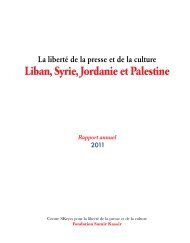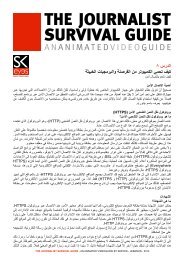Journalists’ Security in War Zones: Lessons from SyriaAPPENDIX 1Minimum Working Standards forJournalists in Conflict ZonesBackgroundOn the weekend of 12-14 July 2013, some 45journalists gathered in Beit Mery, Lebanon,with representatives from top internationalpress freedom organisations to discuss thechallenges faced by reporters in conflict zones,with a particular focus on Syria. Attending theconference were staff journalists from medium tolarge news organisations and freelance journalistswith vastly different amounts of experience andrepresenting a cross section of media – fromprint to photo journalists, documentary makersand radio reporters. Together, they were taskedwith coming up with a document articulating theminimum working standards for every journalistcovering conflict, whether staff journalist orfreelancer. The document, which is presentedbelow, includes recommendations to employersand to the journalists themselves.Recommendations to employers- Ensure the journalist possesses adequateprotective gear and communicationequipment, appropriate to the conflict zoneand in line with recommendations from pressfreedom organisations. (27)- Cover communications expenses incurred bythe journalist in accordance with pre-establishedlimitations agreed upon by both parties.- Ensure the journalist has undergoneappropriate medical and safety training.- Ensure the journalist has insurance to a levelappropriate to the conflict zone he/she isreporting from, in line with recommendationsfrom press freedom organisations.- Pre-establish a communications plan withthe journalist. Typically, this consists of thejournalist checking in with a designatedperson at a designated time in order to quicklyrecognise if a journalist is in trouble, missing orkidnapped, and deal accordingly.- Possess the contact details of the journalist’semergency contact. This person should havethe contact details of the journalist’s familyand access to documents the journalist hasauthorised the employer to read in case ofsuspicion or confirmation of kidnap or death.- Provide the journalist with a written copy ofthe terms of employment.- Provide journalists with access to emergencyfunds to cover any expected or unexpectedcosts of working in a war zone. (28)- Refuse to pay sources interviewed by journalists.- Encourage debriefings between editors andjournalists after the reporter has emerged froma conflict zone. During such meetings, editorsshould be updated on the latest security issueswithin the country and remind journaliststhat there are anonymous, non-judgmentalcounselling services available. (29)2827. These include, but are not limited to, encryption for communication devices, satellite phones, headgear, body protection and first aid.28. This may include, but is not limited to, backup equipment due to high probability of a lack of electricity and Internet access, fixers,translators and drivers.29. Some organisations implement mandatory counselling for employees returning from war zones. This should be seriously consideredby news organisations.
APPENDIX 1Recommendations to journalists• Before going to the field, journalists should:- Get adequate insurance and suitablevaccinations, in line with recommendationsfrom press freedom organisations.- Get proper safety, communications, first aidequipment and post-rape kit.- Undergo trainings relevant to the conflictarea, in line with recommendations from pressfreedom organisations. (30)- Have a communications plan with theemployer and/or a trusted third party who isknown to the employer.- Provide a trusted contact with access to andcopies of emergency numbers, passportdetails, insurance details, press card, will andother necessary details in the event of aninjury, kidnapping or death.- Know how much he/she will get paid perstory.- Read his/her contract(s).- Take the time to prepare, research and planthe trip adequately.- Understand how to secure informationin communication devices so that his/hersecurity and that of third parties will not becompromised if the journalist is apprehendedor interrogated by a potentially unfriendlyparty.• In the field, journalists should:- Behave conscientiously and respectfully. (31)- Respect his/her fixers and agree on detailsregarding payment (including timing, amountand method) before work is carried out.- Not pay for information received fromsources.- Be conscious not to stay too long in oneplace and in the conflict zone in general, as itincreases risk factors.- Be aware that communications can beintercepted and adapt behaviour to minimiserisk. This includes, but is not limited to,removing SIM cards when mobile phonesare not in use; being careful not to revealinformation that might compromise thecurrent or future locations of the journalistand his/her contacts; being ready to movelocation after using phones, including satellitephones.• After reporting from a conflict zone,journalists should:- Undergo a debriefing with his/her employer.- Check up on fixers, if it is safe to do so, andensure payment for work done.- Not be afraid to seek psychological support.30. This includes, but is not limited to, safety, first aid and communications encryption.31. This includes, but is not limited to, showing awareness and appreciation for different cultures, reflected through adhering to normaldress codes and attitudes.29




